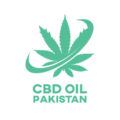As CBD oil continues gaining attention in Pakistan’s wellness market, a common question has emerged among consumers: Why is CBD oil so expensive in some places and relatively cheap in others? While the therapeutic potential of CBD is widely acknowledged, navigating its pricing can be overwhelming for both new and seasoned users.
This guide unpacks the real factors influencing CBD oil pricing in Pakistan. We’ll explore what goes into the cost, highlight the dangers of underpriced products, and recommend a premium option backed by science and trust.
What Is CBD Oil, and Why Are People Using It?
Cannabidiol (CBD) is a naturally occurring compound found in the hemp plant (Cannabis sativa). Unlike THC, it does not produce a “high” or intoxicating effect. Instead, it interacts with the body’s endocannabinoid system, a biological network that helps regulate sleep, mood, pain perception, and immune function (Zou & Kumar, 2018).
Due to its non-psychoactive profile, CBD is used for a variety of wellness goals. For example, research has linked CBD with reduced anxiety symptoms (Blessing et al., 2015), effective pain management (Vučković et al., 2018), and improved sleep patterns (Shannon et al., 2019). As these benefits become more widely known, demand continues to rise in Pakistan.
However, this increase in popularity has led to confusion about how much CBD oil should cost—and why some options are priced drastically higher than others.
What Affects CBD Oil Pricing in Pakistan?
Although prices range from PKR 2,500 to over PKR 10,000 for a standard 30ml bottle, they are not arbitrary. Several key factors determine the final cost of a quality CBD product.
1. Source of Hemp and Extraction Process
To begin with, the origin of the hemp plant has a major influence. Oils extracted from organically grown hemp—particularly from the U.S. or Europe—are more expensive because they meet higher quality standards and comply with agricultural regulations.
Additionally, the extraction method plays a crucial role. CO₂ extraction is the gold standard, as it preserves the integrity of cannabinoids and terpenes without leaving behind harmful residues. In contrast, cheaper products often use ethanol or butane extraction, which may compromise safety and effectiveness.
2. Full-Spectrum vs. Isolate
Another pricing factor is the type of CBD formulation. Full-spectrum CBD oil includes other beneficial cannabinoids (like CBG and CBN) and trace amounts of THC (below 0.3%). These compounds work together in what scientists call the “entourage effect,” enhancing therapeutic outcomes (Russo, 2011). On the other hand, CBD isolate contains only cannabidiol and is typically less effective—though often cheaper.
3. Potency and Dosage
Furthermore, the CBD concentration in each bottle significantly affects price. A 1000mg CBD bottle is more potent than a 300mg one and may offer more value over time despite a higher initial cost. Therefore, assessing cost per milligram is more accurate than comparing bottle prices alone.
4. Testing and Certification
Reliable CBD brands invest in third-party lab testing to confirm purity and potency. These tests screen for contaminants such as heavy metals, pesticides, and residual solvents. Although testing adds to production expenses, it ensures transparency and consumer safety—especially important in a market like Pakistan that lacks strict regulations.
5. Logistics and Local Fulfillment
Finally, factors like customs duties, packaging, warehousing, and courier services influence pricing. Brands that offer fast delivery through COD-enabled couriers like Leopard Courier must account for additional operational costs, which are typically reflected in product pricing.
The Risks of Buying Cheap CBD Oil
While affordability might seem appealing, ultra-cheap CBD oils come with risks:
- No lab reports or ingredient transparency
- Inaccurate CBD content or poor bioavailability
- Possible contamination with heavy metals or solvents
- Presence of unregulated synthetic cannabinoids
According to a study in JAMA, nearly 70% of CBD products sold online were mislabeled, with incorrect levels of CBD or THC, posing potential health risks (Bonn-Miller et al., 2017).
CBD Oil Price Tiers in Pakistan (2025)
| Tier | Price Range (PKR) | Features |
|---|---|---|
| Budget Isolates | 2,500 – 4,000 | No lab testing, low CBD concentration, isolate-only |
| Mid-Tier Imports | 5,000 – 7,000 | Full-spectrum, basic testing, 500–800mg potency |
| Premium Full-Spectrum | 7,000 – 10,000+ | CO₂-extracted, lab-certified, organic hemp, high potency |
Is CBD Legal in Pakistan?
As of 2025, CBD is not explicitly banned in Pakistan, particularly when it contains less than 0.3% THC and does not cause intoxication. Therefore, CBD oil exists in a legal gray zone—not actively regulated, but not criminalized either.
However, due to the absence of regulatory oversight, it’s critical for consumers to buy only from transparent, lab-tested, and trusted sources.
Why Paying More for Quality Is Worth It
CBD oil is not just another supplement; it’s a therapeutic wellness tool backed by science. When used properly, it may help with:
- Chronic stress and anxiety relief
- Sleep improvement
- Inflammation and pain reduction
Research by Pisanti et al. (2017) and Skelley et al. (2020) shows that full-spectrum, lab-tested CBD oil provides superior outcomes compared to low-quality or mislabeled alternatives.
In short, investing in a quality formulation protects your health, ensures efficacy, and avoids wasting money on ineffective products.
Recommended Product: BIO HACK BLISS
If you’re looking for a premium option in Pakistan, we recommend:
🌿 BIO HACK BLISS
Powered by Shamanic Biohacker LLC
- 8000mg Full-Spectrum Hemp Extract
- CO₂-Extracted | Organically grown U.S. hemp
- Third-Party Lab Tested
- Non-GMO | Vegan | Less than 0.3% THC
- Plant-powered calm with every drop
🛒 Limited-Time Offer
💰 PKR 5000 + PKR 200 COD (via Leopard Courier)
🚚 1–2 day delivery available across Pakistan
🔗 Order now at: www.cbdvape-pakistan.com
Conclusion
Understanding CBD oil pricing in Pakistan helps consumers move beyond sticker shock and evaluate what truly matters—quality, safety, and therapeutic value. By focusing on lab-tested, full-spectrum products from trusted brands, you ensure both peace of mind and better wellness outcomes.
For those ready to experience the best in CBD, BIO HACK BLISS offers premium-grade calm—delivered nationwide.
References (APA Format)
- Blessing, E. M., Steenkamp, M. M., Manzanares, J., & Marmar, C. R. (2015). Cannabidiol as a potential treatment for anxiety disorders. Neurotherapeutics, 12(4), 825–836. https://doi.org/10.1007/s13311-015-0387-1
- Bonn-Miller, M. O., Loflin, M. J. E., Thomas, B. F., Marcu, J. P., Hyke, T., & Vandrey, R. (2017). Labeling accuracy of cannabidiol extracts sold online. JAMA, 318(17), 1708–1709. https://doi.org/10.1001/jama.2017.11909
- Pisanti, S., Malfitano, A. M., Ciaglia, E., Lamberti, A., Ranieri, R., Cuomo, G., & Bifulco, M. (2017). Cannabidiol: State of the art and new challenges for therapeutic applications. Pharmacology & Therapeutics, 175, 133–150. https://doi.org/10.1016/j.pharmthera.2017.02.041
- Russo, E. B. (2011). Taming THC: Potential cannabis synergy and phytocannabinoid-terpenoid entourage effects. British Journal of Pharmacology, 163(7), 1344–1364. https://doi.org/10.1111/j.1476-5381.2011.01238.x
- Shannon, S., Lewis, N., Lee, H., & Hughes, S. (2019). Cannabidiol in anxiety and sleep: A large case series. The Permanente Journal, 23, 18–041. https://doi.org/10.7812/TPP/18-041
- Skelley, J. W., Deas, C. M., Curren, Z., & Ennis, J. (2020). Use of cannabidiol in anxiety and anxiety-related disorders. Journal of the American Pharmacists Association, 60(1), 253–261. https://doi.org/10.1016/j.japh.2019.11.008
- Vučković, S., Srebro, D., Vujović, K. S., Vučetić, Č., & Prostran, M. (2018). Cannabinoids and pain: New insights from old molecules. Frontiers in Pharmacology, 9, 1259. https://doi.org/10.3389/fphar.2018.01259
- Zou, S., & Kumar, U. (2018). Cannabinoid receptors and the endocannabinoid system: Signaling and function in the central nervous system. International Journal of Molecular Sciences, 19(3), 833. https://doi.org/10.3390/ijms19030833
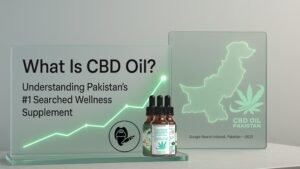
What Is CBD Oil? The Complete 2025 Beginner’s Guide for Pakistan
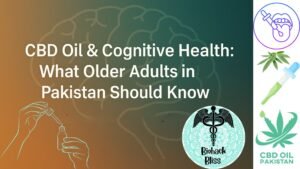
🧠 CBD Oil & Cognitive Health: What Older Adults in Pakistan Should Know
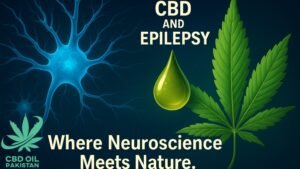
🧠 CBD Oil and Epilepsy: The Science Behind Seizure Control in Pakistan
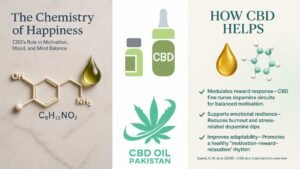
CBD and Dopamine: The Science of Motivation & Happiness
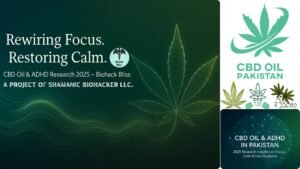
🧠 CBD Oil & ADHD in Pakistan: What 2025 Research Reveals About Focus, Calm & Neurobalance
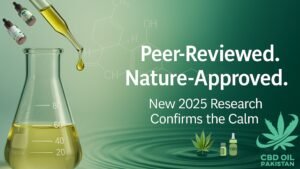
Peer-Reviewed CBD Studies (Last 3 Months): What 2025 Research Reveals About Safety & Anxiety Relief

Hemp-Derived CBD Infused Honey — Now Available in Pakistan
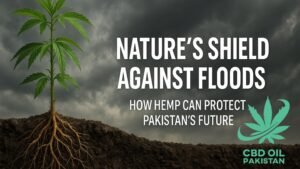
Hemp & Flood Prevention: Lessons from Thailand for Pakistan’s Climate Future

What Is CBD Oil? The Complete 2025 Beginner’s Guide for Pakistan
What Is CBD Oil? Understanding Pakistan’s #1 Searched Wellness Supplement If you search “CBD Oil Pakistan”, you’ll find dozens of new sellers, inconsistent information, and

🧠 CBD Oil & Cognitive Health: What Older Adults in Pakistan Should Know
🧬 The Ageing Brain: Why Cognitive Health Matters As Pakistan’s population ages, more adults are confronting memory lapses, slower recall, and mental fatigue — subtle

🧠 CBD Oil and Epilepsy: The Science Behind Seizure Control in Pakistan
When Modern Science Still Searches for Answers Despite centuries of medical advancement, modern science still struggles to fully understand why epilepsy happens. The condition—marked by

CBD and Dopamine: The Science of Motivation & Happiness
From Stress to Success with Full-Spectrum Botanical Support In a world where hustle culture is the norm and burnout is pervasive, many of us ask:
